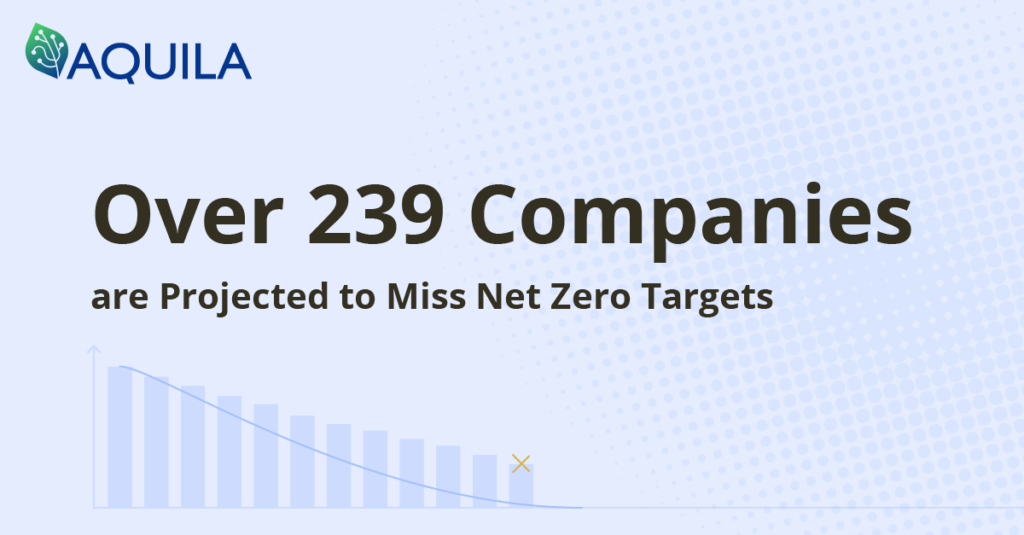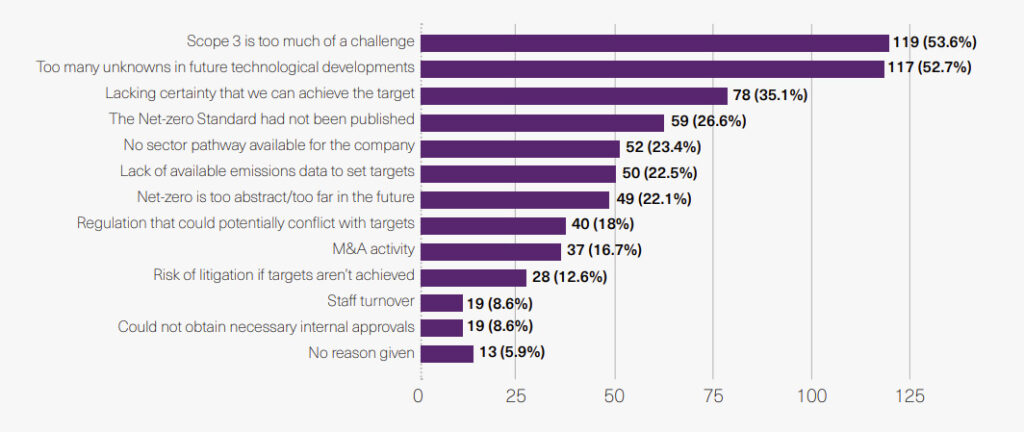Since its inception in 2019, over 1,000 companies have signed up for the Business Ambition for 1.5C Campaign. However, the road to carbon-neutral and sustainable production remains rocky. Among the 971 corporates analyzed in a recent study by the Science Based Targets Initiative (SBTi), which assesses companies’ progress in setting and implementing climate targets in alignment with the 2016 Paris Agreement, 239 of them had their net-zero commitments revoked, due to non-compliance.
The majority of firms cite Scope 3 Emissions as their most significant challenge in meeting Net-Zero goals.

The Science Based Targets Initiative (SBTi), founded in 2015, is a global organization that encourages companies to set climate action targets aligned with the latest climate science, aiming to reduce greenhouse gas emissions in line with the Paris Agreement. The SBTi mandates that companies and financial institutions set science-based targets within 24 months of their pledge. Those who fail to meet this requirement are listed as “Commitment Removed” on the SBTi Dashboard, following a policy change in January 2023.
Well-known brands such as Diageo, Microsoft, Unilever, Marks & Spencer, and Procter & Gamble, many of which were supporters of climate initiatives, have seen their commitments delisted from the SBTi dashboard.
Although it is possible for these companies to resubmit their commitments through the initiative in the future, SBTi’s decision still has a considerable negative impact on their reputation when it comes to sustainability initiatives.
The most significant obstacle, cited by 54% of companies involves managing value-chain emissions.
According to SBTi, “About half of the survey respondents identified the complexity of Scope 3 emissions as a major hurdle in setting net-zero targets.” SBTi also observed that “Only a small number of companies are prepared to set ambitious, long-term decarbonization targets for their value chain,” noting that for some, the uncertainties are too great.
Recently, the US Securities and Exchange Commission decided to exclude Scope 3 emissions from its new climate disclosure regulations following corporate concerns about the challenges and costs of acquiring precise data.
Coming in close in second place, cited by around 53% of companies, uncertainties in technological advancement are also a pressing concern. In a nutshell, the Top 5 biggest challenges by companies in setting Net-Zero targets are:

Walmart has reduced over 1 gigaton of emissions since 2017, and is now analyzing its Scope 3 emissions to refine its strategy in line with the Greenhouse Gas Protocol. Walmart continues to hold its status with the SBTi while working toward its net-zero targets.
Despite SBTi removing its net-zero commitment, Microsoft continues to pursue its 2020 environmental goals and maintains a near-term, SBTi-validated target.
Procter & Gamble (P&G) is actively collaborating with SBTi, having validated its near-term Scope 1, 2, and 3 emissions reduction targets, and remains dedicated to transparent, science-based climate action.
Unilever’s initial net-zero target was found incompatible with SBTi’s methodology, leading to a revised plan that aims for a 42% reduction in Scope 3 emissions. The company anticipates SBTi approval soon and is committed to achieving its net-zero ambitions by 2039 through emissions reductions and carbon removals.
The SBTi recognizes the challenges identified in this study, especially the difficulty of managing Scope 3 emissions. To address these, the SBTi will expand its sector-specific standards and implement regional differentiation to engage more participants from the global south.
Furthermore, a comprehensive review of the SBTi corporate net-zero standard will be conducted next year, with insights gained guiding future improvements and helping companies better align their climate targets with the 1.5°C pathway. These steps will support businesses in setting clear, ambitious, and compliant targets that can enhance the industry’s ability to meet global climate goals.